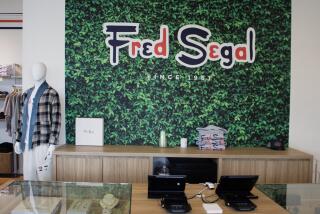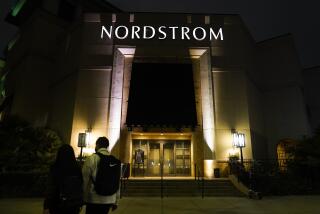Chief’s Task: Keep Stores From Stalling
- Share via
Terry J. Lundgren is known as a deft merchandiser, a retail innovator and a student of changing shopping trends. But can he stop Federated Department Stores Inc. from just running in place?
It’s a bigger question than ever now that Federated is planning to buy May Department Stores Co.
Lundgren, a 52-year-old Long Beach native, gets high marks from some observers for keeping Federated a relevant player in the department-store industry. In fact, they said, Lundgren stands out among retail executives for his willingness to change store formats, rearrange merchandise displays, listen to customer complaints and let managers take risks.
Responding, perhaps, to the rise of the mammoth discounters that have made off with so many traditional department-store customers, Lundgren even experimented with equipping some of Federated’s Rich-Macy’s stores with shopping carts.
“He is always aggressively looking for ways to improve, and he’s not afraid to try new things,” said Paul Charron, chief executive of apparel maker Liz Claiborne Inc., a key supplier to department stores.
One new thing he favors: stamping all of Federated’s regional chains with either the Bloomingdale’s or Macy’s brand. That would give all the company’s stores national name recognition and put Federated’s advertising dollars to more cost-effective use. It would also spell the end of the Robinsons-May name.
Lundgren, who began his career 30 years ago in Los Angeles at the bygone Bullock’s department-store chain, orchestrated Federated’s planned acquisition of May. The deal hasn’t won universal praise, with some analysts criticizing Lundgren for deciding to purchase another department-store chain instead of assets that might offer better growth prospects.
“Terry Lundgren just went out and bought a buggy-whip company,” said Howard Davidowitz, chairman of Davidowitz & Associates, a retail consulting and investment banking firm in New York. “Department stores have done one thing in the last 15 years: consolidate and close stores.”
Lundgren has spent most of his career at Federated. He was named president in 1997 and became its chief executive two years ago. His base salary is now $1.25 million a year.
He wasn’t available Monday to comment for this article, a Federated spokeswoman said. In announcing the May deal, he told analysts on a conference call that “we believe passionately that department stores have an important place in the ever-changing and very competitive broad retail environment.”
And Lundgren has previously disputed the notion that Federated can’t keep growing, noting that fears about the future of department-store retailing have been raised again and again, with the arrival of home-shopping networks, outlet stores and the Internet.
“We’ve had our share of predictions that the department-store business wouldn’t be able to compete with new forms of retail,” he told the Cincinnati Enquirer in 2002.
Still, it hasn’t been easy to compete.
Federated’s sales in its fiscal year ended Jan. 29 were $15.6 billion, nearly unchanged from six years ago. Its fiscal 2004 earnings, $689 million, were up a mere 4% over that period. Its profit margins and returns on stockholders’ equity also are little changed.
It might have been worse, observers said, had Lundgren not tried out so many ways to court more shoppers.
During his administration, various Federated stores have pared the amount of merchandise to focus on better-selling items, centralized check-out stations, created bigger fitting rooms and expanded private-label apparel brands such as Alfani. Some stores jazzed up junior’s sections, installing plasma TV screens that showed teens as they tried on clothes and computers that let them send the images to their buddies.
One of six children, Lundgren is 6 feet, 3 inches tall and a self-professed clothes nut who loves Armani suits. Divorced with two daughters, he didn’t plan on being a retailer until after he earned a bachelor’s degree at the University of Arizona, where he had dabbled with the idea of becoming a veterinarian.
Instead he joined Federated’s old Bullock’s division in 1975 and later became president of its Bullock’s Wilshire specialty fashion group.
He left Federated in 1988 and joined Neiman Marcus Group Inc., where he was reunited with Allen Questrom, his former boss at Bullock’s.
Questrom by then was Neiman Marcus’ CEO, but Questrom soon left to turn around Federated. Lundgren then took over as CEO of Neiman Marcus until 1994, when he returned to Federated as its head of merchandising.
More to Read
Inside the business of entertainment
The Wide Shot brings you news, analysis and insights on everything from streaming wars to production — and what it all means for the future.
You may occasionally receive promotional content from the Los Angeles Times.










